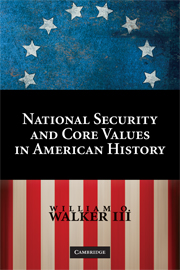Book contents
- Frontmatter
- Contents
- Preface and Acknowledgments
- Introduction: “A City upon a Hill”
- PART ONE THE ORIGINS OF THE SECURITY ETHOS, 1688–1919
- 1 Commerce, Expansion, and Republican Virtue
- 2 The First National Security State
- PART TWO INTERNATIONALISM AND CONTAINMENT, 1919–1973
- PART THREE THE AGE OF STRATEGIC GLOBALISM, 1973–2001
- PART FOUR THE BUSH DOCTRINE
- Conclusion: The Security Ethos and Civic Virtue
- Select Bibliography
- Index
- References
2 - The First National Security State
Published online by Cambridge University Press: 05 June 2012
- Frontmatter
- Contents
- Preface and Acknowledgments
- Introduction: “A City upon a Hill”
- PART ONE THE ORIGINS OF THE SECURITY ETHOS, 1688–1919
- 1 Commerce, Expansion, and Republican Virtue
- 2 The First National Security State
- PART TWO INTERNATIONALISM AND CONTAINMENT, 1919–1973
- PART THREE THE AGE OF STRATEGIC GLOBALISM, 1973–2001
- PART FOUR THE BUSH DOCTRINE
- Conclusion: The Security Ethos and Civic Virtue
- Select Bibliography
- Index
- References
Summary
Today the United States is practically sovereign on this continent, and its fiat is law upon the subjects to which it confines its interposition.
Richard Olney, 1895[Roosevelt is] clearly insane…and insanest upon war and its supreme glories.
Mark TwainAmerican institutions are on trial before a court of American citizens.
Eugene V. Debs, 1918From the vantage point of the twenty-first century, it is evident that there was more certainty than contingency in the emergence of the United States as a great power in the 1890s. Advocates of an international presence for the United States were hopeful of building their imperial dreams on the dynamic growth of capital and industry at home. For those living through that tumultuous time, however, the growth of American power did not seem inevitable. For many, the 1890s were fundamentally a time of passionate conflict about what it meant to be an American and the critical importance of basic values to the conduct of public affairs.
Three Americans who were born within a two-year span – Theodore Roosevelt in 1858 and William Jennings Bryan and Charlotte Perkins (Gilman) in 1860 – had markedly contrasting ideas about identity and values. Add to the list the slightly older Eugene V. Debs (1855), and the spectrum of views reflects contemporary thinking about modernity and industry in a global imperial age.
- Type
- Chapter
- Information
- National Security and Core Values in American History , pp. 45 - 72Publisher: Cambridge University PressPrint publication year: 2009



